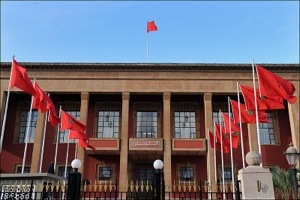Two dozen new laws were passed by the Moroccan Parliament during the just-concluded legislative session.
By Hassan Benmehdi for Magharebia in Casablanca
 [AFP/Abdelhak Senna] “There has been a high level of responsible debate, both in terms of quality and of quantity,” Popular Movement MP El Hachmi Semmouni says.
[AFP/Abdelhak Senna] “There has been a high level of responsible debate, both in terms of quality and of quantity,” Popular Movement MP El Hachmi Semmouni says.
Moroccan MPs can at last enjoy their summer holidays. After some lively encounters in Parliament, the spring session of the 2011-2012 legislative year came to a close Monday (August 13th).
At a press briefing on Monday in Parliament, the Chairman of the Chamber of Representatives, Abdelkrim Ghellab, stressed that the first legislative year of the current government’s mandate was largely dominated by politics.
“This has been a political year ‘par excellence’, marked by the adoption of the new Constitution, the latest round of early legislative elections, leading to a change of power and the enshrinement of the principle linking responsibility and accountability,” Ghellab said.
El Hachmi Semmouni from the Popular Movement group told Magharebia that the overall assessment of the spring session remains positive: “In all seriousness, this has been a convincing performance, because there has been a high level of responsible debate, both in terms of quality and of quantity.”
During this spring session, the Parliament passed 24 bills, including an organic law regarding the appointment of high-ranking officials.
The new laws deal with justice, the basic guarantees accorded to servicemen within the royal army, the financial and commercial sectors, political, economic and social reforms, and improved moral standards in public life.
Other bills described as urgent were drafted on the agriculture and maritime fishery sectors.
However, other MPs took the view that progress has been slow and legislative productivity has failed to meet aspirations.
“No fewer than twenty bills are still pending, while the government has a duty to speed up the rate of legislative activity,” commented Driss Radi from the Constitutional Union.
Other MPs said the time factor and the nature of the political state of affairs got in the way of greater legislative productivity.
Redouane Zaïdi, a member of the PJD’s parliamentary group, underlined the “uniqueness of this session, given the prevailing political situation”, adding that legislative activities concentrated on internal regulation and urgent laws, with a view to speeding up their adoption.
Related Articles
Morocco to fight rentier economy
2012-02-03
Benkirane responds to critics
2012-05-21
Moroccan parties form governing coalition
2011-12-08
Benkirane government wins confidence vote
2012-01-31
Moroccan military immunity bill raises uproar
2012-05-31
Abdelatif Ouahbi, who chairs the parliamentary group of the Authenticity and Modernity Party (PAM), called it a feeble session, explaining that, with exception of the laws on fundamental guarantees granted to servicemen and appointments to high office, the government has not brought forward organic laws to enable the provisions of the new constitution to be implemented.
The latest legislative session also marked the implementation of Article 100 of the Constitution concerning monthly debates on general policy led by the head of the government. But some observers claim not enough has been done to carry out constitutional reforms.
However, Prime Minister Abdelilah Benkirane has maintained a reassuring and confident tone, saying that “this session has given a new impetus to the process of change in the way our institutions work, to meet expectations in society… the Chamber of Representatives is now a real actor in the political process upon which the country has embarked.”
Where reforms to internal regulations within the Chamber of Representatives are concerned, next September there will be an examination of proposals from different parliamentary groups with a view to drafting a new law aimed at resolving the problem of unjustified absenteeism among MPs.






